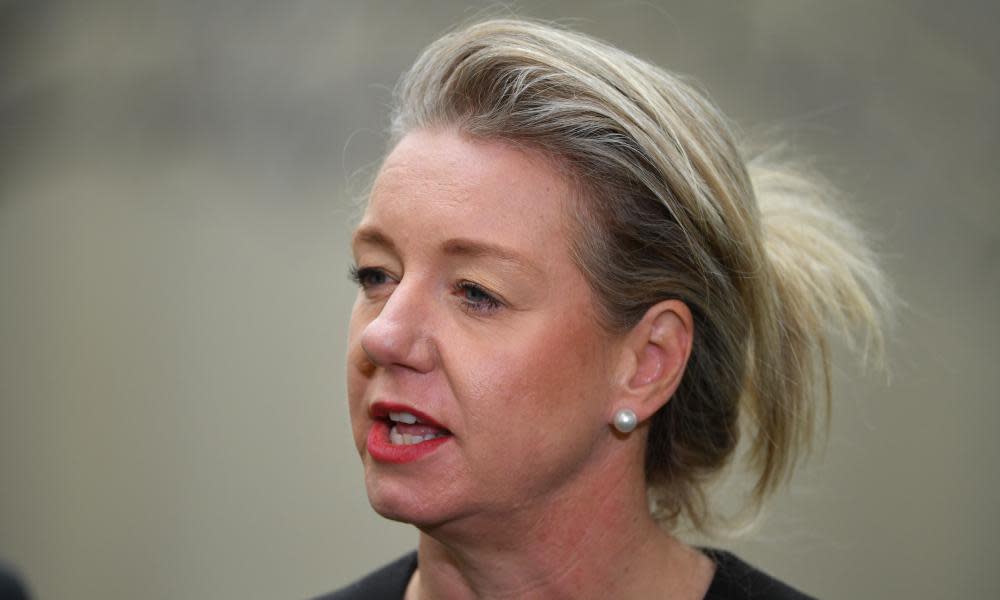Health official ignored warning about Bridget McKenzie's authority to give sports grants, inquiry told

A warning about former sports minister Bridget McKenzie’s legal authority to give out millions of dollars in grants went to a high-level official in the health department but was ignored, according to new evidence to the sports rorts inquiry.
An email handed to the Senate inquiry reveals that in June 2018 a health department official warned a superior that McKenzie might need to formally order Sport Australia to make her the decision-maker for grants programs. The official suggested the department get legal advice.
The new evidence draws into question why the health department failed to warn Sport Australia that it might need to seek legal advice about the $100m community sport infrastructure grant program.
The chair of the inquiry, Labor senator Anthony Chisholm, seized on the evidence, which he said contradicted claims from health department officials in August that the email document was “a one-off email between relatively junior officers”.
The email from an official in the department’s office of sport was sent to an unnamed recipient but copied in the assistant secretary of corporate assurance, Narelle Smith.
McKenzie never issued a formal statutory direction to Sport Australia to give her power to make grants, a fact that led the Australian National Audit Office to conclude it was “not evident” she had authority to decide $100m of grants.
Sport Australia did not obtain legal advice until February 2020. By that time the $100m of grants had been delivered, the ANAO’s scathing report had been released and McKenzie had resigned over a conflict of interest related to the grants.
The program funded $100m of sports grants the audit office found were skewed towards target and marginal electorates.
In mid-2018 the health department asked Sport Australia on McKenzie’s behalf to allow her to approve funding, resulting in final guidelines that stated “the minister for sport will provide final approval”.
The ANAO found that in June 2018 the department had identified that “in the event the minister was to be the approver, legal advice may be required” on whether she would need to issue a formal direction to Sport Australia to make her the decision-maker.
Asked to provide the document that formed the basis for that conclusion, the health department produced an internal email from an official in its office of sport about the rules governing ministerial powers to make grants.
The official noted Sports Australia needs ministerial approval for grants of $500,000 or more but “is silent on whether this need for approval only for amounts of $500,000 or more precludes the minister from approving amounts less than $500,000”.
Related: Sports rorts: inquiry didn't consider whether Bridget McKenzie had legal authority
“In summary, it is my opinion that whilst the minister can approve any amount of expenditure, there is no provision … that gives the minister authority to approve expenditure where the amount is less than $500,000.”
It noted she did have a statutory power to formally direct Sport Australia to make her “the expenditure delegate” for a program.
“It may be worth seeking further advice from legal services if the minister intends to pursue this option.”
Chisholm told Guardian Australia the government had “tried to cover up any information that would show if [McKenzie] did or didn’t have the legal authority”, including blocking Sports Australia from presenting a summary of its advice.
Chisholm noted the email questioning McKenzie’s authority appeared to have been sent to an assistant secretary, “raising further questions about who knew what, when and why [they] apparently took no further steps to get advice on the issue of legal authority”.
In a Senate inquiry hearing in August, the health department associate secretary, Caroline Edwards, played down the significance of the email, describing it as “discussions between developmental officers at a middle to lower level”.
Edwards said there was “no prior or later follow-up” to the email and no evidence the department ever warned Sport Australia to obtain legal advice.
“It wouldn’t have been our role to seek legal advice or provide it and so on,” she said.
Lawyers have identified a number of legal issues with the program, including that there may be no constitutional power for the federal government to give sports grants and that McKenzie failed to formally direct Sport Australia to substitute her decisions for its own.
Beechworth Lawn Tennis Club has challenged the grants program in the federal court, but Sport Australia has defended the legality of the program, arguing it was entitled to take McKenzie’s views into account when awarding grants.
In May, McKenzie blamed Sport Australia and the health department for failing to warn her about potential issues with her legal authority to give grants, arguing it should have been raised before the spending went through cabinet.


